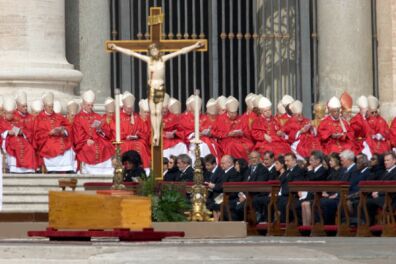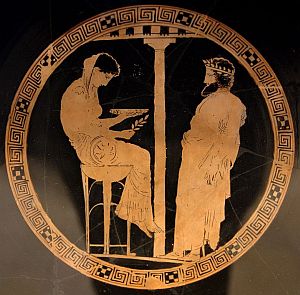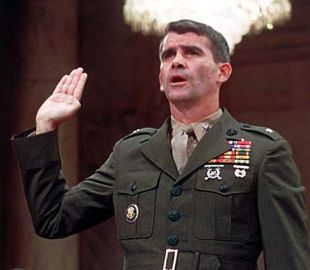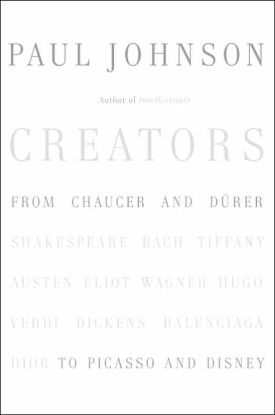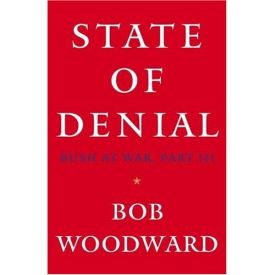Press & Prejudice
From The New CriterionAleppo: not so deplorable as Trumpists, apparently
On the same day that the instantly infamous “vulgar video” of Donald Trump’s bawdy conversation with Billy Bush in 2005 was taking the media by storm, a headline in The Guardian (to an article by Natalie Nougayrède) asked: “We are watching the destruction of Aleppo. Where is the rage?” Well, as soon as the words appeared, we knew where the rage was: all gone to swell the media’s chorus of contempt for Mr. Trump’s self-described locker room language of over a decade ago. And yet no one seemed to have noticed or cared what that said about the media’s sense of priorities, let alone the genuineness of their concern for suffering Syria.
Mr. Trump himself fleetingly tried to make the point during the second presidential debate, held in St. Louis the following day, when he responded to the inevitable question about his bad language and bad behavior by pointing to “the carnage all over the world today” that was being caused by terrorists. “They look at us,” he said, referring either to the terrorists or to the rest of the world — but then he seemed to lose his train of thought and ended by promising, not for the first time, to give ISIS a good thumping when he becomes president.
Those of us who were around for the presidential election of 1996 might have been reminded by Ms Nougayrède’s question of Bob Dole’s asking “Where’s the outrage?” over Bill Clinton’s first term. Unfortunately for Mr Dole’s doomed campaign, we had to wait two more years to find out. It was only waiting for Monica Lewinsky’s indiscreet telephone conversations with Linda Tripp. That must be why on debate night Mr Trump, supposing himself to understand what really matters to the media and seeking to answer outrage with outrage, took the precaution of conducting a pre-debate panel on Facebook with three women whose allegations of sexual assault against Bill Clinton came out in the wake of l’affaire Monica and one who had been raped at age twelve and whose rapist was defended in court by Mrs Clinton — who then laughed with delight at her own legal prowess in getting him off with a light sentence.
The four women were also seated in the audience for the debate itself and pointed out by Mr Trump as part of his reply to the sex question. His point was that Mr Clinton had actually done the things he had only talked about doing, though the media and the debate moderators tried to portray his words as tantamount to a confession that he had committed sexual assault. But his stunt could also have pointed the contrast between the media’s reaction then and now. Back in 1998, I seem to remember a fair bit of agonizing among the hommes sérieux of the media over what the Clinton sex scandals said about their (and our) priorities and what would be the consequence for their coverage of politics — even as they raced to uncover the latest salacious details.
This time, of course, there were no such scruples in evidence. I guess everyone has grown so used to the media’s scandal-obsession by now that it was hardly worthy of remark. No more was the timing of the release of the video by the allegedly non-partisan and independent media to cause the maximum damage to Mr Trump. In his case, there was none of the kind of soul-searching that went on over the old Clinton scandals. Quite the reverse, in fact. The media’s triumphalism over the blow it had delivered to one towards whom they had already given such abundant evidence of their ill-will was almost as unlovely as Mr Trump’s lewd remarks had been.
Good old Dana Milbank of the Washington Post, who had hardly let a columnar occasion go past for the previous sixteen months without striking such blows as he was able to strike against the Trump candidacy, took the opportunity to slam the candidate’s now even more reluctant Republican supporters for not having already known what the tape purported to reveal and what, of course, he already knew. “We knew this Trump all along,” read the headline to his column. But in that case, why was the tape the killer blow that he and his media confrères were heralding it as? In the London Daily Telegraph the headline to a piece by Claire Cohen read: “We now have cold hard proof of what I’ve known all along: Donald Trump is a full-fat misogynist.” But how did this “cold hard proof” differ from the evidence on which she had based what she had “known all along”? After all, there have always been plenty of other tapes available on which Mr Trump has made grossly inappropriate and “sexist” remarks. Those from the “Access Hollywood” tape were different, as Dana Milbank acknowledges, only in degree.
But the alleged revelation did give the anti-Trump media a chance to rehearse all those other instances of what we, or they, have known all along but which they, or we, had learned to think comparatively unimportant up until now. On another page of the Post Marc Fisher proudly announced “a new batch of recordings from Howard Stern’s radio shows” that had been aired again by CNN: “More Trump tapes surface with crude sex remarks.” Surface? You’d think that Howard Stern and his interviews with Mr Trump had never been heard of before. Wasn’t this, then, just what the Clintons have long been fond of calling, in their own case, “old news” — which just happened to appear on the day of the St Louis debate as if it were the latest investigative report? Meanwhile, the ace sleuths of The New York Times were on the same day, debate day, noticing “Donald Trump’s Long Record of Degrading Women” — just in case there was anyone left on the planet who didn’t know that, in the media’s view, Mr Trump has a Long Record of Degrading Women.
You might almost think that these papers, and the TV and radio news outlets that took their lead in producing similar reports, were trying to prejudice the debate audience against Mr. Trump. If so, it wouldn’t have been the first time. On the day of the first debate the headline to a Washington Post editorial read: “It’s beyond debate that Donald Trump is unfit to be president.” The article still absent-mindedly referred to that night’s event as a “debate,” but it was pretty clear that the idea was to pre-empt it by suggesting that the question it was supposedly being held to answer had, in the Post’s view, already been decided by things that Mr Trump had said or done long before stepping onto the stage on September 26 — or before the vulgar video “surfaced” less than two weeks later. Accordingly, wrote the Post editorialist, there could be “nothing much at stake” in the debate — “or shouldn’t be, because there is not much more to learn.”
The Post’s oxymoronic contention that the debate was beyond debate clearly could not be true unless it was something other than a debate, something more, perhaps, like a pantomime re-enactment by the candidates of their own media stereotypes, on the basis of which most if not all of the audience could be presumed, like the Post itself, already to have made up their minds. For, indeed, that is what the alleged debates appeared mostly to be. But for the common nomenclature and the pretense of continuity with the past, no one who had witnessed an actual debate would have been in any danger of confusing it with one of these gladiatorial extravaganzas devoted to competitive grievance- or scandal-mongering, prepared one-line “zingers” and the appearance of health and confidence — or the lack of them — to be diagnosed by the media’s arbiters along with their judgment as to who has “won.”
But surely the media’s judgment as to who has won and lost must be compromised by their openly proclaimed partisanship? Winning and losing now either have no meaning or their meaning is predetermined. As the debates themselves are all spin, it can hardly be surprising that neither their meaning nor their outcome can be known, apart from the spin the candidates or the media or we ourselves choose to put on them. How can I trust even my own ability to form an unbiased opinion when there is no other standard than the extent to which my own prejudices have been confirmed?
The most reverberant remark of the referendum campaign which ended in Britain’s vote to leave the European Union last June may turn out to have been Michael Gove’s much publicized response, three weeks before polling day, to a question suggesting that most “experts” were backing “Remain.” “I think,” said Mr Gove, who at the time was the Lord Chancellor but also a principal spokesman for the “Leave” campaign, “people in this country have had enough of experts.” One reason he made such a media splash by saying this was that both sides thought the remark supported their cause. The Remainders regarded it as a gaffe, revealing what they regarded as the Luddism or Know-nothing-ism of the Brexiteers, while the latter thought that those leaning their way, who turned out to be a majority, really were fed up with experts — or at least those whose status as such had been conferred on them by the media.
For in Britain as in America, the job of reporting the news has in recent years too often taken a back seat to the reinforcement, with the help of media-identified experts, of an elite, bipartisan consensus on everything from trade to global warming to how to stimulate the economy to gay marriage. This consensus is also seen in both countries as being under threat from an incipient revolt by social and intellectual undesirables, or those that Hillary Clinton called — and some of whom have now taken proudly to calling themselves — “the deplorables.” I think it was not more than about 48 hours after she said this that I saw a Trump-style baseball cap embroidered with the words, “Make America Deplorable Again.” At least it suggests that the insurgents, unlike the elites, haven’t lost their sense of humor.
The media themselves, in other words, are the real experts in their own conceit. What they see as their unassailable moral authority gives them the right to identify the right experts, as it does to report the right facts, and so to decide in advance all those questions once supposed by non-experts to be debatable — including the outcome of this year’s presidential debates. Even without the Post’s acknowledgment it would have been clear that these have been taken out of the debaters’ hands and turned over to the experts who not only tell us (often under the guise of “fact-checking”) what is and isn’t legitimate for the debaters to say but what they really mean by it and what we are supposed to think about it. That might sound like hyperbole worthy of the media themselves, but every day during the debating season, my e-mail inbox has received, as perhaps yours has, an advertised special offer sent by the Post to its presumptively politically bewildered digital subscribers: “What they said, what they meant: The Fix’s Aaron Blake texts you the highlights from the presidential and vice presidential debates. Sign up for the must-read analysis, must-know fact checkers, and must-see moments from all the debates.”
If the outcome of the debates and the character of the debaters is known in advance, if the “debates” are not even debatable, what could possibly be must-read, must-know or must-see about them? Only, presumably, the skill with which some media worthy like The Fix’s Aaron Blake is able to dazzle us by explaining them as further instances of what, like Dana Milbank, we already know. Every reporter now aspires to be an expert semiotician automatically qualified to read the signs of these non-debatable debates on behalf of an audience presumptively less qualified than himself to tell us what it all really means. The signs visible only to the experts are therefore assumed to be more important than anything the candidates may say of a substantive nature.
Which may of course be the reason why they don’t say anything very much of a substantive nature, or why that which they do say is reduced to platitudes. Anything else risks being turned into a “gaffe” by the media’s eagle-eyed interpreters — which was why some of us allowed ourselves to get a little bit excited by the Trump candidacy as it committed one would-be gaffe after another without ever appearing to be damaged by any of them. Could we once again hope, we thought, to listen to political speech which had something of interest to say in its own right and not merely as filtered through the media’s licensed interpreters?
No, probably not. This was partly because Mr Trump didn’t have all that much interesting to say apart from the gaffes — though still more than Mrs Clinton had — and partly because, if readers or viewers couldn’t work out for themselves what were the gaffes they were meant to be offended by, there was always an expert at hand, ready to attach to each its appropriate label: racism, sexism, xenophobia etc. Once these words had been repeated often enough, and treated often enough as factual statements, you can have had no excuse for not knowing how the candidate had condemned himself out of his own mouth and so rendered the debate you thought you were witnessing no longer debatable.
A year and a half ago, I would probably have agreed that a Trump candidacy was beyond debate, but at least I recognize that that has proven, and rather spectacularly, not to be the case. The only way the Post can cling to its pre-campaign certainties in the face of so much contrary evidence is by the expedient of something like Mrs Clinton’s “basket of deplorables” — that is, by regarding certain classes of opinion as tantamount to bigotry and therefore illegitimate — as the idea that Britain should exit the EU was widely regarded as illegitimate until a majority voted that it should. Even now, it is considered illegitimate by those who find it an affront to their self-approved expertise in divining the bad motives of those with whom they disagree.
At the end of the Post’s “beyond debate” editorial, we read this:
It has been said that the true test of an ordinary person’s character is how you behave when no one is watching. The corollary standard for a presidential candidate could be: how you behave repeatedly in public, before the one big night when everyone is watching. Even by that more forgiving standard, Mr. Trump has already flunked.
This “corollary standard” hasn’t even the authority of “it has been said” behind it. Nobody is saying it but the editorialist himself. But it is telling that he — or she or it — feels no need to cite any authority but his own. The right of the media to erect their own standards and to judge politicians by them —to judge not only of winners and losers in debate but of ultimate fitness for office — is apparently, like Mr Trump’s unfitness, beyond debate.
Discover more from James Bowman
Subscribe to get the latest posts to your email.


